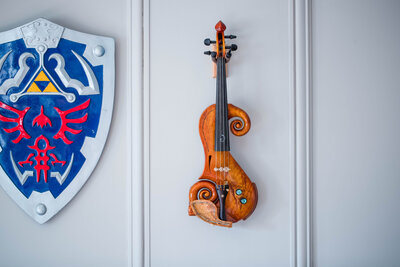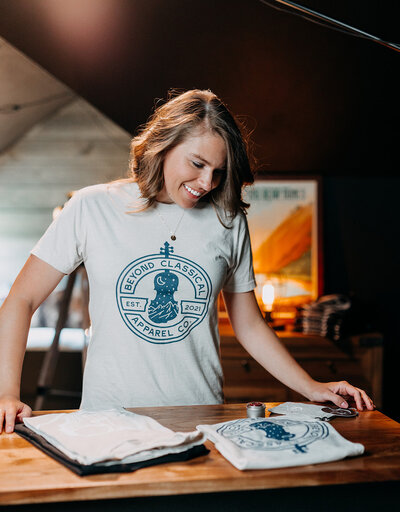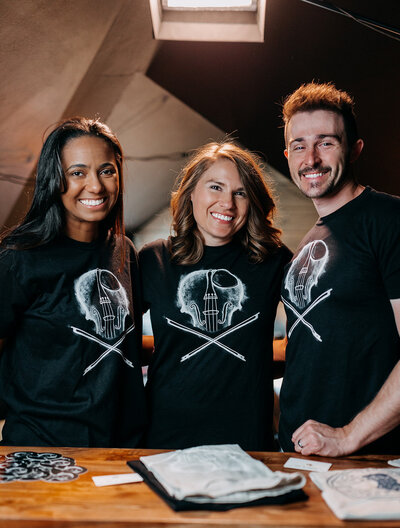In today’s over-crowded social media space, how are you going to stand out and attract the right audience as an indie musician? There are a lot of different music promotion strategies out there now, but it can feel really overwhelming and be difficult to even know where to start.
The key to standing out in today’s industry lies in personal branding, but this is a HUGE topic and again can feel really overwhelming, especially if you’ve never thought of your music career in these terms yet. But that’s ok because we’re going to be breaking things down in this blog one piece at a time!
Just as a quick side note, if you’re still trying to figure out how to start making your own music check out my blog post here where I break down my process for making music.
To help you get started in the simplest way possible, I want you to ask yourself these 2 questions: 1) Why are you creating music? And 2) Who are you creating that music for?
The “Why” Behind What You Do
First let’s focus on why you’re creating your music. Let’s try starting out with these questions:
- Why do you play your instrument or why did you become a singer?
- Where does your musical style come from?
- Who are your artistic inspirations?
- If you’re a cover artist, why do you choose the covers you release?
Alright so now that you’ve got some of these things written down you’re already one step closer to getting your personal branding in order. But now you might be thinking “ok great but how do I communicate these things to my audience without it sounding like I’m just telling them a bunch of random facts about myself?”
Storytelling for Indie Musicians
The answer is through storytelling.
Instead of thinking of the answers to these questions like they’re some sort of indie musician promotion pitch, think about the different stories you could tell someone centered around why you make the kind of music you make, or why you decided to become an indie musician.
Storytelling allows you to present your experiences in a way that is relatable to other people, and that word relatable is really key here. You want to try and allow your audience to see something of themselves in the stories you share. If you do a good job with it, it allows you to tell someone something about yourself without it feeling like it’s all about you.
So for each of the questions I presented, write down as many personal stories as you can think of, and feel free to go beyond my questions and add in any other stories about why you do what you do.
How I’ve Used Storytelling
I’ll give you a quick example of how I’ve used storytelling when promoting some of my music.
I cover a lot of songs from video games.
When I tell my audience about why I cover video game music, I tell them that the reason I got into video games was because I have an older brother who played all the time and I wanted to be just like him when I was younger… I tell them about how I played video games as an escape from a lot of bullying at school, or I tell them how the soundtrack from certain video games (specifically the Final Fantasy series) influenced my style and made me want to start composing my own music.


I could go on and on because there are SO many stories I can tell about why I choose to cover the type of music I do.
The cool thing is that by telling stories my audience can relate to, I’m able to make a much more lasting impression and create a deeper bond with them.
I’ve regularly shared stories about the struggles I had with bullying when I was younger and how I was able to use video games and music as an escape, and I’ve received countless messages from members of my audience telling me they went through the same thing, or that my music helped them through a hard time.
In my opinion those types of messages are honestly the most rewarding kind to receive, and you’re probably only going to get them if you’re willing to share some deeper personal things with your audience that they can relate to.
Your Stories Won’t Connect With Everyone
Now you might be thinking to yourself, “What if someone isn’t interested in my stories or can’t relate to them? Won’t I be alienating some people?” Yes, that will happen, but it’s supposed to be that way.
There are tons of people who will come across what you’re doing and think “that was nice” and then go on about their day without thinking of you again, but there’s always going to be a certain percentage of people who always want more from you whether it’s music or anything else because something you shared really resonated with them on a deeper level.
These people are your “true fans” who are most likely going to support what you’re doing in the most meaningful way. These are the people you want to write your stories for because it will not only help create that deeper connection with them, but it’ll also help you attract more of your ideal audience members who are most likely to become your true fans down the road the more they learn about you.
So this means you need to be strategic with the stories you share, and in order to do that you need to have a clear picture of who in your audience you’re trying to resonate with. Which brings me to my next point…
“Who” Are you Making Music For?
This question is so simple that it’s often easy to overlook, but it’s so important! When you imagine your ideal audience member, the person who’s just going to love everything you’re releasing and listen to you on repeat, who are they?
When you’re thinking about who you’re creating music for, try to boil it down to your ideal audience member, the person who’s going to come to your live shows, buy your albums and merch, and support whatever else you’re releasing and offering. Here’s a few questions to ask yourself about that person:
Demographics
- What age are they?
- Are they married or single?
- Do they have kids?
- What’s their gender?
- Where do they live?
- What industry do they work in?
- What’s their educational background?
- What kind of neighborhood did they grow up in?
Personal Interests
- What kind of hobbies do they have?
- Do they play an instrument or sing?
- What kinds of shows/movies do they watch?
- What kind of social media do they use?
- Who are their favorite musicians or bands?
- What kind of hobbies did they have growing up?
Does this mean that all of your ideal audience members should fit this exact profile? Of course not! Depending on your style and the type of music you release you might have broader appeal and a very diverse audience, or you might have an audience made up of people who are very similar, and that’s totally fine either way.
The goal here is simply to give yourself someone to have in mind when you’re creating your content. When you’re posting, writing emails, or making music, you should be making it with this ideal audience member in mind.
It’s ok if you don’t have an answer to all of these questions, just try to get as many as you can. If you can answer more questions about who your ideal audience member is then that’s great!
These questions are just examples to give you a good place to start, but the more you work towards creating an ideal audience member profile, the easier it’ll be to home in on a music promotion strategy to get your music in front of the right people.
Connecting To Your Audience with Your Personal Branding
Alright so we’ve covered who you are and who you’re making your content for, but now we have to make a connection between the two.
This brings us back to what we talked about earlier with storytelling.
You can almost think about your ideal audience member as the filter for what kinds of stories you should share with your audience.
If your ideal audience member can relate to the story you’re going to share in some way, then it’s definitely one worth telling. And of course these aren’t strict rules that you can never break. Sometimes you’re going to have to experiment a little bit to better understand who your ideal audience members are and see what really resonates with them.
But just as a side note, you should only be sharing things that you truly want your audience to know about you and you always want to be completely genuine with what you share. So just make sure you’re sharing things that feel authentic to the relationship you’re building with your audience.
Shouldn’t My Music Be Enough?
I have to address this before we end, because I know that some indie musicians think that their music will build enough of a connection with their audience all on its own and that they don’t need to worry about personal branding, storytelling, or anything else we’ve been talking about here.
That’s absolutely going to be true for some people in your audience. Your music is all they really care about and they’re happy to just enjoy your music and content for free and then move on.
It’s not a bad thing to have people like this in your audience, and in fact for many musicians this type of person makes up the majority of their audience, but if this is the only type of person in your audience, you’re probably in for some trouble.
If you don’t take personal branding seriously, you’re going to end up having a really hard time building a strong enough connection with anyone in your audience and most people aren’t going to feel compelled to support you in any way.
Your biggest supporters and true fans are going to be people who can relate to you in some way beyond your music, and the only way they’re going to be able to relate to you is if you share personal stories with them. Understanding this connection and building it in a genuine way is critical to your success as an indie musician.
Conclusion
The bottom line is that you can stand out as an indie musician by sharing more about yourself. You need to connect your “Why” to your “Who”.
And you need to create and release consistent content besides just your music that your audience connects with. While this can be a real challenge for so many musicians, it’s also our best tool for attracting and growing an audience of passionate supporters who truly connect with our music and brand. In order to create content that serves both your Ideal Audience and your own career goals (and doesn’t drive you crazy constantly stressing out about what and where to post next) you need a system, and that’s what I share inside my Branding & Content Creation online course!
This course gives you the blueprint for creating intentional, goal-oriented content that fully represents your music and brand to attract and connect with the right audience – and teaches you how to avoid wasting time creating content that ultimately doesn’t serve your goals. You can learn more about it here.
Talk to you again soon!
Taylor








+ show Comments
- Hide Comments
add a comment